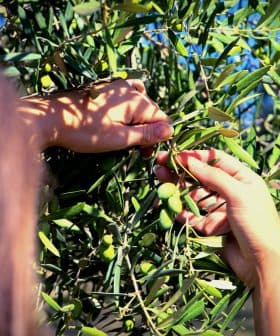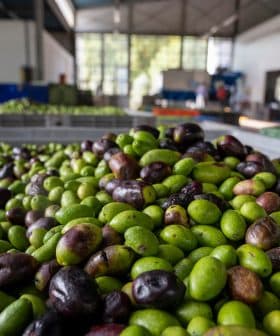Certain Food Proteins Reduce Bitterness and Pungency of Extra Virgin Olive Oil
The findings could pave the way to increase the appeal of extra virgin olive oil for consumers turned off by bitter and pungent flavors.
Researchers from the Monell Chemical Senses Center have found that a food-derived protein from egg yolks can reduce the bitterness and pungency of extra virgin olive oil when bound to the appropriate protein, potentially increasing its appeal to consumers. The study also showed that the elimination of these sensations depends on the amount of protein added, suggesting that producers could market certain extra virgin olive oils for different culinary uses to enhance consumer experience.
From Australia to Uruguay and California to Turkey, producers tell Olive Oil Times reporters that potential customers are sometimes put off by the bitterness and pungency of robust extra virgin olive oils.
These sensations come from the polyphenols found in extra virgin olive oil, notably oleocanthal. Polyphenols are powerful antioxidants and are responsible for many of the product’s health benefits.
The compounds believed to be the most important for extra virgin olive oil health benefits are also those evoking bitterness and throat pungency.
Now, a team of researchers from the Monell Chemical Senses Center, where oleocanthal was first identified, have set out to study the relationship between taste perceptions and polyphenols more closely.
See Also:Tips for Selecting High-Polyphenol Olive OilsThey discovered that a food-derived protein from egg yolks can reduce or eliminate both the oral pungency detected in the throat and bitter sensations of extra virgin olive oil when bound to the appropriate protein. This, they argue, may widen the appeal of extra virgin olive oil to the unanointed.
As part of the study, extra virgin olive oil was placed into a mayonnaise-type material. Several hours later the oil-mayonnaise mixture was found to be less pungent and bitter. The researchers concluded that this elimination of bitterness and pungency occurs when proteins bind with oleocanthal and other phenolic compounds.
“This demonstrates that phenolic compounds and other reactive compounds often interact with proteins,” Catherine Peyrot des Gachons, a research associate at Monell, told Olive Oil Times.
“In presence of certain proteins, the pungent oleocanthal and the bitter-tasting phenolic compounds could no longer activate their respective sensory receptors,” she added. “This means that the activation of other physiological targets might also be modified, positively (stronger activation) or negatively (weaker activation).
The researchers also found that the degree to which the proteins eliminated the oral pungency detected in the throat and bitterness depended on the amount added. They argue that their findings will help producers better market their products to consumers, recommending that certain extra virgin olive oils be used in cooking rather than finishing, for example.
“The study shows the perceptual characteristics of an extra virgin olive oil tasted in liquid form will evolve depending on its culinary use, and pungency and bitterness might be suppressed,” Peyrot des Gachons said.
However, she stipulated that better education for consumers may also make the sensations more palatable. Learning that oral pungency detected in the throat and bitterness are directly associated with extra virgin olive oil’s health benefits may tip the scales for many consumers anyways.
“What is fascinating with a product like olive oil is the direct association between the oil perceptual properties and its expected health-promoting properties,” Peyrot des Gachons said. “The compounds believed to be the most important for extra virgin olive oil health benefits are also those evoking bitterness and throat pungency.”
She added that the Monell Chemical Senses Center plans to continue researching oleocanthal’s properties and better understanding how it interacts with other food components.
“We are particularly interested in oleocanthal in our lab,” Peyrot des Gachons said. “We are now studying the nature of the interaction of oleocanthal with different proteins with the goal of understanding how it might impact the activation of some of its physiological targets.”









